- Home
- John Irving
Trying to Save Piggy Sneed Page 2
Trying to Save Piggy Sneed Read online
Page 2
The night his pig barn burned, we were so surprised.
The Stratham Volunteers were used to thinking of Piggy Sneed's place as a necessary, reeking ruin on the road between Exeter and the beach -- a foul-smelling landmark on warm summer evenings; passing it always engendered the obligatory groans. In winter, the smoke from the wood stove pumped regularly from the pipe above Piggy's stall, and from the outdoor pens, stamping routinely in a wallow of beshitted snow, his pigs breathed in little puffs as if they were furnaces of flesh. A blast from the siren could scatter them. At night, coming home, when whatever fire there was was out, we couldn't resist hitting the siren as we passed by Piggy Sneed's place. It was too exciting to imagine the damage done by that sound: the panic among the pigs, Piggy himself in a panic, all of them hipping up to each other with their wheezy squeals, seeking the protection of the herd.
That night Piggy Sneed's place burned, we Front Street children were imagining a larkish, if somewhat retarded, spectacle. Out the coast road, lights up full and flashing, siren up high -- driving all those pigs crazy---we were in high spirits, telling lots of pig jokes: about how we imagined the fire was started, how they'd been having a drinking party, Piggy and his pigs, and Piggy was cooking one (on a spit) and dancing with another one, and some pig backed into the wood stove and burned his tail, knocked over the bar, and the pig that Piggy danced with most nights was ill-humored because Piggy wasn't dancing with her... but then we arrived, and we saw that this fire wasn't a party; it wasn't even the tail end of a bad party. It was the biggest fire that we Front Street children, and even the veterans among the Stratham Volunteers, had ever seen.
The low, adjoining sheds of the pig barn appeared to have burst, or melted their tin roofs. There was nothing in the barn that wouldn't burn -- there was wood for the wood stove, there was hay, there were 18 pigs and Piggy Sneed. There was all that kerosene. Most of the stalls in the pig barn were a couple of feet deep in manure, too. As one of the veterans of the Stratham Volunteers told me, "You get it hot enough, even shit will burn."
It was hot enough. We had to move the fire trucks down the road; we were afraid the new paint, or the new tires, would blister in the heat. "No point in wasting the water," our captain told us. We sprayed the trees across the road; we sprayed the woods beyond the pig barn. It was a windless, bitter cold night, the snow as dry and fine as talcum powder. The trees drooped with icicles and cracked as soon as we sprayed them. The captain decided to let the fire burn itself out; there would be less of a mess that way. It might be dramatic to say that we heard squeals, to say that we heard the pigs' intestines swelling and exploding -- or before that, their hooves hammering on the stall doors. But by the time we arrived, those sounds were over; they were history; we could only imagine them.
This is a writer's lesson: to learn that the sounds we imagine can be the clearest, loudest sounds of all. By the time we arrived, even the tires on Piggy's truck had burst, the gas tank had exploded, the windshield had caved in. Since we hadn't been present for those events, we could only guess at the order in which they had taken place.
If you stood too close to the pig barn, the heat curled your eyelashes -- the fluid under your eyelids felt searing hot. If you stood too far back, the chill of the winter night air, drawn toward the flames, would cut through you. The coast road iced over, because of spillage from our hoses, and (about midnight) a man with a Texaco emblem on his cap and parka skidded off the road and needed assistance. He was drunk and was with a woman who looked much too young for him -- or perhaps it was his daughter. "Piggy!" the Texaco man hollered. "Piggy!" he called into the blaze. "If you're in there, Piggy -- you moron -- you better get the hell out!"
The only other sound, until about 2:00 in the morning, was the occasional twang from the tin roof contorting -- as it writhed free of the barn. About 2:00 the roof fell in; it made a whispering noise. By 3:00 there were no walls standing. The surrounding melted snow had formed a lake that seemed to be rising on all sides of the fire, almost reaching the level of heaped coals. As more snow melted, the fire was being extinguished from underneath itself.
And what did we smell? That cooked-barnyard smell of midsummer, the conflicting rankness of ashes in snow, the determined baking of manure -- the imagination of bacon, or roast pork. Since there was no wind, and we weren't trying to put the fire out, we suffered no smoke abuse. The men (that is to say, the veterans) left us boys to watch after things for an hour before dawn. That is what men do when they share work with boys: they do what they want to do; they have the boys tend to what they don't want to tend to. The men went out for coffee, they said, but they came back smelling of beer. By then the fire was low enough to be doused down. The men initiated this procedure; when they tired of it, they turned it over to us boys. The men went off again, at first light -- for breakfast, they said. In the light I could recognize a few of my comrades, the Front Street children.
With the men away, one of the Front Street children started it -- at first, very softly. It may have been me. "Piggy, Piggy," one of us called. One reason I'm a writer is that I sympathized with our need to do this; I have never been interested in what nonwriters call good and bad "taste."
"Piggy! Piggy! Piggy! Piggy! OINK! WEEE!" we called. That was when I understood that comedy was just another form of condolence. And then I started it; I began my first story.
"Shit," I said -- because everyone in the Stratham Volunteers began every sentence with the word "shit."
"Shit," I said. "Piggy Sneed isn't in there. He's crazy," I added, "but nobody's that stupid."
"His truck's there," said one of the least imaginative of the Front Street children.
"He just got sick of pigs," I said. "He left town, I know it. He was sick of the whole thing. He probably planned this -- for weeks."
Miraculously, I had their attention. Admittedly, it had been a long night. Anyone with almost anything to say might have easily captured the attention of the Stratham Volunteers. But I felt the thrill of a rescue coming -- my first.
"I bet there's not a pig in there, either," I said. "I bet he ate half of them -- in just a few days. You know, he stuffed himself! And then he sold the rest. He's been putting some money away, for precisely this occasion."
"For what occasion?" some skeptic asked me. "If Piggy isn't in there, where is he?"
"If he's been out all night," another said, "then he's frozen to death."
"He's in Florida," I said. "He's retired." I said it just that simply -- I said it as if it were a fact. "Look around you!" I shouted to them. "What's he been spending his money on? He's saved a bundle. He set fire to his own place," I said, "just to give us a hard time. Think of the hard time we gave him," I said, and I could see everyone thinking about that; that was, at least, the truth. A little truth never hurt a story. "Well," I concluded. "He's paid us back -- that's clear. He's kept us standing around all night."
This made us Front Street children thoughtful, and in that thoughtful moment I started my first act of revision; I tried to make the story better, and more believable. It was essential to rescue Piggy Sneed, of course, but what would a man who couldn't talk do in Florida? I imagined they had tougher zoning laws than we had in New Hampshire -- especially regarding pigs.
"You know," I said, "I bet he could talk -- all the time. He's probably European," I decided. "I mean, what kind of name is Sneed? And he first appeared here around the war, didn't he? Whatever his native language is, anyway, I bet he speaks it pretty well. He just never learned ours. Somehow, pigs were easier. Maybe friendlier," I added, thinking of us all. "And now he's saved up enough to go home. That's where he is!" I said. "Not Florida -- he's gone back to Europe!"
"Atta boy, Piggy," someone cheered.
"Look out, Europe," someone said, facetiously.
Enviously, we imagined how Piggy Sneed had gotten "out" -- how he'd escaped the harrowing small-town loneliness (and fantasies) that threatened us all. But when the men came back, I was confronted with the
general public's dubious regard for fiction.
"Irving thinks Piggy Sneed is in Europe," one of the Front Street boys told the captain.
"He first appeared here around the war, didn't he, sir?" I asked the captain, who was staring at me as if I were the first body to be recovered from this fire.
"Piggy Sneed was born here, Irving," the captain told me. "His mother was a half-wit; she got hit by a car going the wrong way around the bandstand. Piggy was born on Water Street," the captain told us. Water Street, I knew perfectly well, ran into Front Street -- quite close to home.
So, I thought, Piggy was in Florida, after all. In stories, you must make the best thing that can happen happen (or the worst, if that is your aim), but it still has to ring true.
When the coals were cool enough to walk on, the men started looking for him; discovery was a job for the men -- it being more interesting than waiting, which was boys' work.
After a while, the captain called me over to him. "Irving," he said. "Since you think Piggy Sneed is in Europe, then you won't mind taking whatever this is out of here."
It required little effort, the removal of this shrunken cinder of a man; I doused down a tarp and dragged the body, which was extraordinarily light, onto the tarp with first the long and then the short gaff. We found all 18 of his pigs, too. But even today I can imagine him more vividly in Florida than I can imagine him existing in that impossibly small shape of charcoal I extricated from the ashes.
Of course I told my grandmother the plain truth, just the boring facts. "Piggy Sneed died in that fire last night, Nana," I told her.
"Poor Mr. Sneed," she said. With great wonder, and sympathy, she added: "What awful circumstances forced him to live such a savage life!"
What I would realize, later, is that the writer's business is both to imagine the possible rescue of Piggy Sneed and to set the fire that will trap him. It was much later -- but before my grandmother was moved to the old people's home, when she still remembered who Piggy Sneed was -- when Grandmother asked me, "Why, in heaven's name, have you become a writer?"
I was "her boy," as I've told you, and she was sincerely worried about me. Perhaps being an English Literature major had convinced her that being a writer was a lawless and destructive thing to be. And so I told her everything about the night of the fire, about how I imagined that if I could have invented well enough -- if I could have made up something truthful enough -- I could have (in some sense) saved Piggy Sneed. At least saved him for another fire -- of my own making.
Well, my grandmother is a Yankee -- and Wellesley's oldest living English Literature major. Fancy answers, especially of an aesthetic nature, are not for her. Her late husband -- my grandfather -- was in the shoe business; he made things people really needed: practical protection for their feet. Even so, I insisted to Grandmother that her kindness to Piggy Sneed had not been overlooked by me -- and that this, in combination with the helplessness of Piggy Sneed's special human condition, and the night of the fire, which had introduced me to the possible power of my own imagination ... and so forth. My grandmother cut me off.
With more pity than vexation, she patted my hand, she shook her head. "Johnny, dear," she said. "You surely could have saved yourself a lot of bother, if you'd only treated Mr. Sneed with a little human decency when he was alive."
Failing that, I realize that a writer's business is setting fire to Piggy Sneed -- and trying to save him -- again and again; forever.
Trying to Save Piggy Sneed (1982)
AUTHOR'S NOTES
My grandmother, Helen Bates Winslow, died in Exeter, New Hampshire, only a few days short of her 100th birthday and not long after this memoir was originally published in The New York Times Book Review (August 22, 1982). As you may know, the Today show routinely wishes Happy Birthday to every 100-year-old in the United States -- provided that the Today show knows about it. At my mother's request, I had alerted the Today show; they knew that my grandmother's 100th birthday was pending, when -- quietly, and almost purposefully before the great event -- my grandmother died. I suspect that she had been dreading such a public announcement; she probably believed that her 100th birthday was nobody's business but her own.
Later, in my novel A Prayer for Owen Meany (1989), I gave these particulars to a fictional grandmother, Harriet Wheelwright; in that story, Mrs. Wheelwright would have been 100 years old on Halloween. In several interviews I have admitted that Harriet Wheelwright is the most autobiographical character in any of my fiction, and that the details of Mrs. Wheelwright's death are as close as I could come to imagining the death of my grandmother, Mrs. Winslow. I see now that "Trying to Save Piggy Sneed" was the beginning of A Prayer for Owen Meany, and that the description of Harriet Wheelwright's death in that novel is an alternative ending to the memoir about my grandmother. Therefore, it seems only fitting that I should attach the description here.
My grandmother hated Halloween; it was one of her few quarrels with God -- that He had allowed her to be born on this day. It was a day, in her view, that had been invented to create mayhem among the lower classes, a day when they were invited to abuse people of property... my grandmother's house was always abused on Halloween. Eighty Front Street was feathered with toilet paper, the garage windows were dutifully soaped, the driveway lampposts were spray-painted (orange), and once someone inserted the greater half of a lamprey eel in Grandmother's letter slot. Owen had always suspected Mr. Morrison, the cowardly mailman.
Upon her arrival in the old-age home, Grandmother considered that the remote-control device for switching television channels was a true child of Satan; it was television's final triumph, she said, that it could render you brain-dead without even allowing you to leave your chair. It was Dan who discovered Grandmother to be dead, when he visited her one evening in the Gravesend Retreat for the Elderly. He visited her every evening, and he brought her a Sunday newspaper and read it aloud to her on Sunday mornings, too.
The night she died, Dan found her propped up in her hospital bed; she appeared to have fallen asleep with the TV on and with the remote-control device held in her hand in such a way that the channels kept changing. But she was dead, not asleep, and her cold thumb had simply attached itself to the button that restlessly roamed the channels -- looking for something good.
THE IMAGINARY GIRLFRIEND
Faculty Brat
In my prep-school days, at Exeter, Creative Writing wasn't taught -- the essay was all-important there -- but in my years at the academy I nevertheless wrote more short stories than anything else; I showed them (out of class) to George Bennett, my best friend's father. The late Mr. Bennett was then Chairman of the English Department; he was my first critic and encourager -- I needed his help. Because I failed both Latin and math, I was required to remain at the academy for an unprecedented fifth year; yet I qualified for a course called English 4W -- the "W" stood for Writing of the kind I wanted to do -- and in this selective gathering I was urged to be Creative, which I rarely managed to be.
In my memory, which is subject to doubt, the star author and most outspoken critic in English 4W was my wrestling teammate Chuck Krulak, who was also known as "Brute" and who would become General Charles C. Krulak -- the Commandant of the Marine Corps and a member of the Joint Chiefs of Staff. No less a presence, and as sarcastic a critic as the future General Krulak, was my classmate in English 5, the future writer G. W. S. Trow; he was just plain George then, but he was as sharp as a ferret -- I feared his bite. It was only recently, when I was speaking with George, that he surprised me by saying he'd been deeply unhappy at Exeter; George had always struck me as being too confident to be unhappy -- whereas my own state of mind at the time was one of perpetual embarrassment.
I could never have qualified for Exeter through normal admissions procedures; I was a weak student-- as it turned out, I was dyslexic, but no one knew this at the time. Nevertheless, I was automatically admitted to the academy in the category of faculty child. My father taught in the History Department;
he'd majored in Slavic Languages and Literature at Harvard -- he was the first to teach Russian History at Exeter. I initiated a heightened level of intrafamily awkwardness by enrolling in his Russian History course. Dad rewarded me with a C+.
To say that Exeter was hard for me is an understatement. I was the only student in my Genetics class who failed to control his fruit-fly experiment. The red eyes and the white eyes were interbreeding so rapidly that I lost track of the generations; I attempted to dispose of the evidence in the drinking fountain outside the lab -- not knowing that fruit flies could live (and breed) for days in the water pipes. When the unusable drinking fountain was declared "contaminated" -- it was literally crawling with wet fruit flies -- I crawled forth and made my confession.
I was forgiven by Mr. Mayo-Smith, the biologist who taught Genetics, because I was the only townie (a resident of Exeter) in any of his classes who owned a gun; the biologist needed me -- more specifically, he needed my gun. Boarding students, quite understandably, were not allowed firearms. But as a New Hampshire native -- "Live Free or Die," as the license plates say -- I had an arsenal of weapons at my disposal; the biologist used me as the marksman who provided his Introductory Biology class with pigeons. I used to shoot them off the roof of the biologist's barn. Fortunately, Mr. Mayo-Smith lived some distance from town.
Yet even in my capacity as Mr. Mayo-Smith's marksman, I was a failure. He wanted the pigeons killed immediately after they'd eaten; that way the students who dissected them could examine the food contained in their crops. And so I allowed the pigeons to feed in the biologist's cornfield. When I flushed them from the field, they were so stupid: they always flew to the roof of his barn. It was a slate roof; when I picked them off--I used a 4X scope and a .22 long-rifle bullet, being careful not to shoot them in their crops -- they slid down one side of the roof or the other. One day, I shot a hole in the roof; after that, Mr. Mayo-Smith never let me forget how his barn leaked. The fruit flies in the drinking fountain were the school's problem, but I had shot the biologist's very own barn -- "Personal property, and all that that entails," as my father was fond of saying in Russian History.

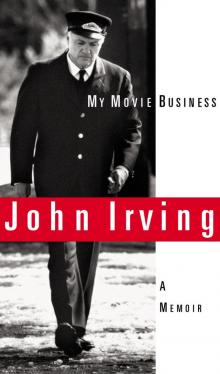 My Movie Business: A Memoir
My Movie Business: A Memoir In One Person
In One Person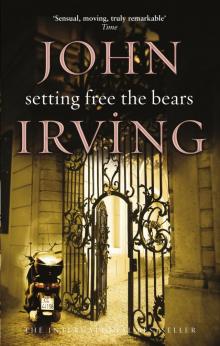 Setting Free the Bears
Setting Free the Bears The Fourth Hand
The Fourth Hand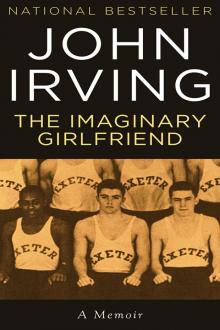 The Imaginary Girlfriend
The Imaginary Girlfriend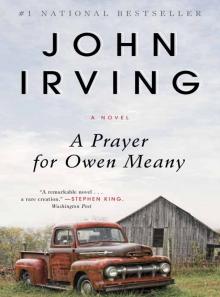 A Prayer for Owen Meany
A Prayer for Owen Meany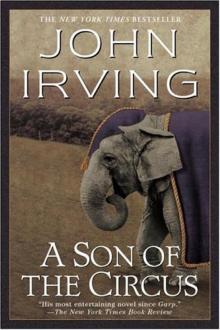 A Son of the Circus
A Son of the Circus Last Night in Twisted River
Last Night in Twisted River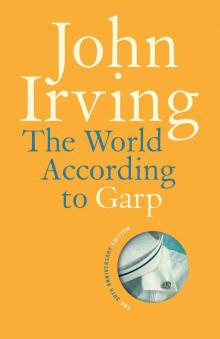 The World According to Garp
The World According to Garp The Cider House Rules
The Cider House Rules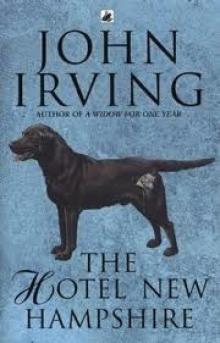 The Hotel New Hampshire
The Hotel New Hampshire The 158-Pound Marriage
The 158-Pound Marriage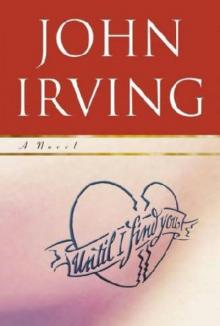 Until I Find You
Until I Find You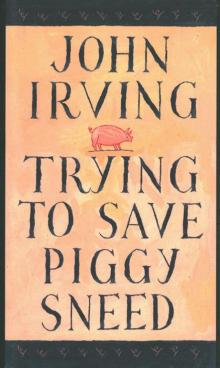 Trying to Save Piggy Sneed
Trying to Save Piggy Sneed Cider House Rules
Cider House Rules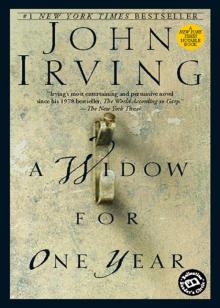 A Widow for One Year
A Widow for One Year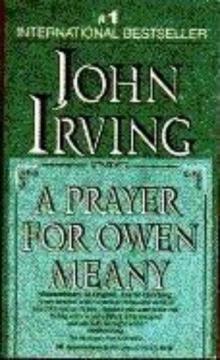 A prayer for Owen Meany: a novel
A prayer for Owen Meany: a novel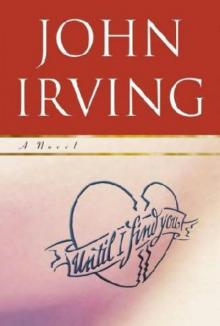 (2005) Until I Find You
(2005) Until I Find You